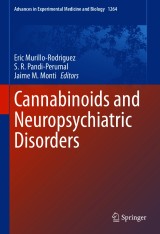Details

Cannabinoids and Neuropsychiatric Disorders
Advances in Experimental Medicine and Biology, Band 1264
|
149,79 € |
|
| Verlag: | Springer |
| Format: | |
| Veröffentl.: | 17.12.2020 |
| ISBN/EAN: | 9783030573690 |
| Sprache: | englisch |
Dieses eBook enthält ein Wasserzeichen.
Beschreibungen
<p>This volume highlights the recent advances in the understanding of the endocannabinoid system and the likely benefit from the therapeutic effects of cannabinoid treatment in a variety of health issues.<br></p><p>Archeological evidence has shown that Cannabis has a long history of use for multiple purposes, including the treatment of medical conditions. The primary active constituent of the hemp plant Cannabis sativa, delta 9-tetrahydrocannabinol (Δ9-THC), causes euphoria, enhancement of sensory perception, tachycardia, antinociception, difficulties in concentration and impairment of memory, among other effects. Despite these undesirable effects, signaling is mostly inhibitory and suggests a putative role for cannabinoids as therapeutic agents by managing several diseases where inhibition of neurotransmitter release would be beneficial.</p>
<p>The themes of this book have been edited and written by world-leaders in the field, The contents of the volume aims at readers from a range of academic and professional disciplines, such as biomedicine, several areas of biology, neurology, clinical medicine and pharmacy.</p>
<p>The themes of this book have been edited and written by world-leaders in the field, The contents of the volume aims at readers from a range of academic and professional disciplines, such as biomedicine, several areas of biology, neurology, clinical medicine and pharmacy.</p>
- Constituents of <i>Cannabis Sativa</i>. - Neuromolecular Mechanisms of <i>Cannabis </i>Action. - Neuropharmacological Effects of the Main Phytocannabinoids: A Narrative Review. - Emerging Roles of Cannabinoids and Synthetic Cannabinoids in Clinical Experimental Models. - Cannabis and Depression. - Recent Advances in the Potential of Cannabinoids for Neuroprotection in Alzheimer’s, Parkinson’s, and Huntington’s Diseases. - Cannabidiol Therapy for Refractory Epilepsy and Seizure Disorders. - Cannabinoid-Based Medicines and Multiple Sclerosis. - Psychiatric Disorders and Cannabinoid Receptors.
<p><b>Dr. Eric Murillo-Rodríguez</b> is Psychologist and holds a PhD. in Biomedical Sciences, both degrees obtained by the National Autonomous University of Mexico (UNAM). Upon graduation, he completed his postdoctoral training at Harvard Medical School. His scientific contribution includes over 70 peer-reviewed publications in various reputed scientific and medical journals, 10 chapters in books. He is an active member of several scientific societies and the editorial board members of various journals.<b><br></b></p><p><b>S. R. Pandi-Perumal, MSc,</b> is the President and Chief Executive Officer of Somnogen Canada Inc, a Canadian Corporation. He is a well-recognized sleep researcher and has authored over 200 publications. His general area of research interest includes sleep and biological rhythms. He has edited over 25 volumes dealing with various sleep-related topics.<br></p><p><b>Jaime Monti, MD</b>, is associated with the University of the Republic, Uruguay. He has completed post-doctoral studies at the National Institute of Health, USA. He is full Professor of Pharmacology and Therapeutic and the School of Medicine of the Republic University, Professor of the Basic Sciences Development Program (PEDECIBA) and Researcher the National Researchers' System. He is a globally recognized sleep researcher and has been awarded with the prestigious Claude Bernard Prize (French Governemnt) and with the Schering Award for Basic Sleep Research (USA). He is an international recognized expert in the neuropharmacology of sleep and wakefulness, with more than two hundred publications in this field.<br></p>
<p><br></p>
<p> </p>
<p><br></p>
<p> </p>
This volume highlights the recent advances in the understanding of the endocannabinoid system and the likely benefit from the therapeutic effects of cannabinoid treatment in a variety of health issues.<p>Archeological evidence has shown that Cannabis has a long history of use for multiple purposes, including the treatment of medical conditions. The primary active constituent of the hemp plant Cannabis sativa, delta 9-tetrahydrocannabinol (Δ9-THC), causes euphoria, enhancement of sensory perception, tachycardia, antinociception, difficulties in concentration and impairment of memory, among other effects. Despite these undesirable effects, signaling is mostly inhibitory and suggests a putative role for cannabinoids as therapeutic agents by managing several diseases where inhibition of neurotransmitter release would be beneficial.</p><p>The themes of this book have been edited and written by world-leaders in the field, The contents of the volume aims at readers from a range of academic and professional disciplines, such as biomedicine, several areas of biology, neurology, clinical medicine and pharmacy.</p>
Provides insight into the neuromolecular mechanism of action Highlights the use of cannabis in major neurologic and psychiatric disorders Explains the recent advances in the understanding of endocannabiniod system Offers important knowledge for researchers and clinicians alike .

















